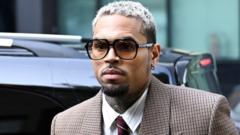Eduardo Bolsonaro has been lobbying the U.S. for support amid his father's legal battles, leading to President Trump's decision to impose 50% tariffs on Brazilian imports in reaction to the perceived political persecution of Jair Bolsonaro.
Tariffs and Political Turmoil: The Bolsonaro Controversy

Tariffs and Political Turmoil: The Bolsonaro Controversy
The Biden administration faces pressure over Bolsonaro's trial in Brazil, as Trump announces significant tariffs.
Since March, Eduardo Bolsonaro, the son of former Brazilian President Jair Bolsonaro, has been actively engaging with White House officials, seeking their backing against what he claims is a politically motivated prosecution of his father. Eduardo, a congressman in Brazil, argues that a Supreme Court judge is unjustly targeting them over allegations regarding a supposedly stolen election. His efforts appear to have resonated with some influential figures in the U.S.
President Trump recently expressed solidarity with Eduardo, drawing parallels between this situation and his own experiences with legal challenges. On July 11, Trump unveiled a sweeping 50 percent tariff on all Brazilian imports, effective from August 1st. He framed this decision as a necessary response to the judicial actions against Bolsonaro, characterizing them as a "witch hunt."
As Brazilian-American relations become increasingly strained, many are watching closely to see how these tariffs will impact trade between the two nations. The situation highlights the intersection of U.S. domestic politics and international relations, revealing complexities that extend beyond economic implications into the realm of political alliances. With Bolsonaro preparing for trial, the evolving dynamics underscore a unique chapter in the ongoing narrative of global political influences.




















